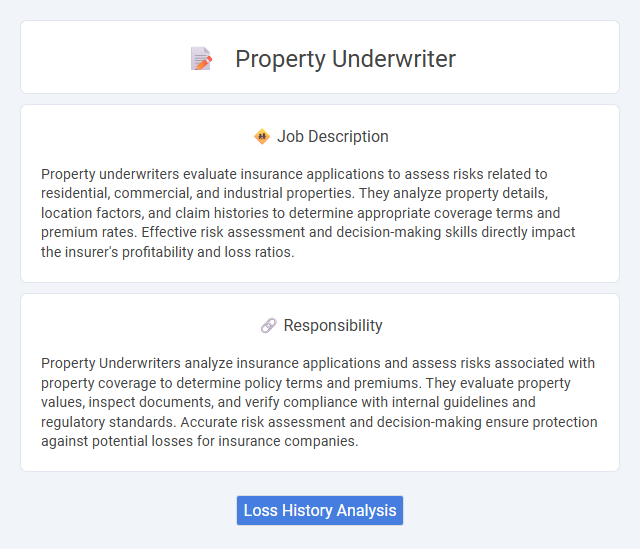
Property underwriters evaluate insurance applications to assess risks related to residential, commercial, and industrial properties. They analyze property details, location factors, and claim histories to determine appropriate coverage terms and premium rates. Effective risk assessment and decision-making skills directly impact the insurer's profitability and loss ratios.
Individuals with strong analytical skills and attention to detail are more likely suited for a property underwriter role, as it requires evaluating insurance risks and determining policy terms. Those who excel under pressure and possess good judgment in assessing complex information probably fit well within this profession. Candidates lacking patience or the ability to interpret financial and legal documents may find the job challenging and less suitable.
Qualification
A Property Underwriter typically requires a bachelor's degree in finance, insurance, business administration, or a related field, with strong analytical and decision-making skills. Professional certifications such as Chartered Property Casualty Underwriter (CPCU) or Associate in Commercial Underwriting (AU) enhance job prospects and demonstrate expertise. Experience with risk assessment, insurance policies, and industry regulations is essential for accurately evaluating property insurance applications and determining coverage terms.
Responsibility
Property Underwriters analyze insurance applications and assess risks associated with property coverage to determine policy terms and premiums. They evaluate property values, inspect documents, and verify compliance with internal guidelines and regulatory standards. Accurate risk assessment and decision-making ensure protection against potential losses for insurance companies.
Benefit
A Property Underwriter likely benefits from a stable career with opportunities for professional growth in the insurance industry. They probably enjoy a strong salary potential combined with comprehensive benefits such as health insurance and retirement plans. The role may also offer intellectual challenges and the chance to develop expertise in risk assessment and property valuation.
Challenge
Property Underwriter roles likely involve assessing risks associated with various properties, which can present significant challenges due to the unpredictability of natural disasters and market fluctuations. The complexity of evaluating diverse property types and coverage requirements probably demands strong analytical skills and continuous learning. Navigating regulatory changes and accurately pricing policies may also pose ongoing difficulties in this profession.
Career Advancement
Property Underwriters who demonstrate strong risk assessment skills and market knowledge can advance to senior underwriting positions or management roles within insurance companies. Mastery of analytical software and continuous professional development through certifications such as CPCU or ARe significantly enhance promotion prospects. Leadership opportunities often involve overseeing underwriting teams, developing risk policies, and directing portfolio strategy to improve profitability.
Key Terms
Loss History Analysis
Property underwriters assess loss history analysis by examining past claims and frequency to determine risk levels accurately. Detailed evaluation of previous property damage, claim severity, and recurrence patterns helps establish appropriate premium rates and coverage limits. This analysis is critical for minimizing insurer exposure and improving underwriting profitability in property insurance.
 kuljobs.com
kuljobs.com